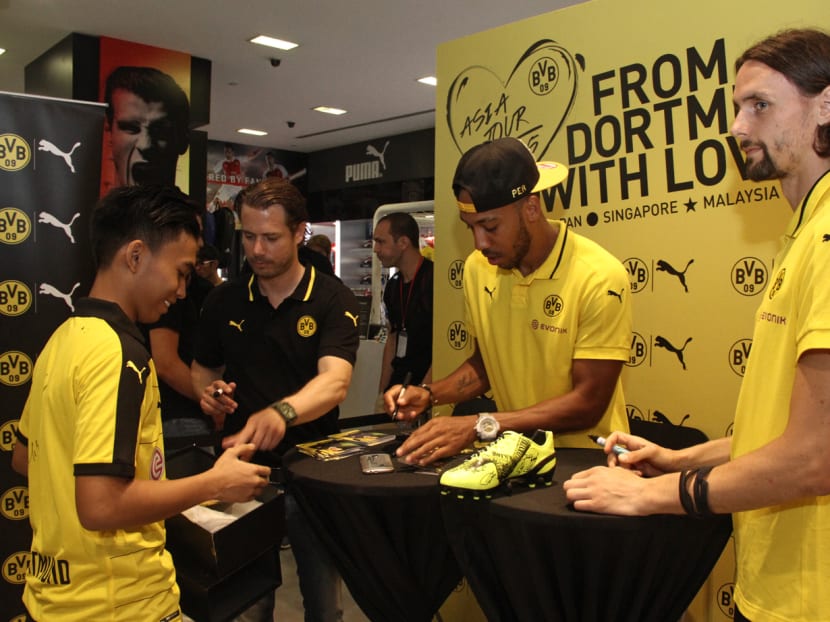Borussia Dortmund ‘not a club that wants to sell’: CEO
SINGAPORE — Key Borussia Dortmund players such as Marco Reus and Mats Hummels, coveted by Premier League giants such as Liverpool and Manchester United, will likely start the season in the club’s yellow-and-black colours in the upcoming 2015/2016 season.

Fans of all ages queued for hours outside GOAL @ 313 for a chance to meet Borussia Dortmund stars Pierre-Emerick Aubameyang, Neven Subotic and Dortmund Youth Academy Director and former player Lars Ricken. Photo: Tristan Loh
SINGAPORE — Key Borussia Dortmund players such as Marco Reus and Mats Hummels, coveted by Premier League giants such as Liverpool and Manchester United, will likely start the season in the club’s yellow-and-black colours in the upcoming 2015/2016 season.
This is because Borussia Dortmund is “not a club that wants to sell”, said chief executive officer Hans-Joachim Watzke in an interview with Channel NewsAsia yesterday (July 10). The club flew into Singapore on Wednesday and ended its Asia tour yesterday.
He said the club is in good financial health, generating 300 million euros (S$452.2 million) in revenue in the last fiscal year, and have no debt and a fully paid-up stadium in the Signal Iduna Park.
Furthermore, players see the value of staying at a club “that gives them confidence” and in an environment where the national press are not against them, rather than switching teams in exchange for “one, two, three million euros”, Mr Watzke said.
PLAYING IN AN UNEVEN FIELD
That said, he acknowledged that big Premier League clubs or European counterparts bankrolled by “oligarchs and sheikhs” will always have the edge over clubs such as Borussia Dortmund, despite the introduction of Union of European Football Associations’ (UEFA) Financial Fair Play (FFP) which was approved on 2010.
The FFP seeks to ensure European clubs are operated sustainably and debts are repaid. “The aim of Financial Fair Play is not to make all clubs equal in size and wealth, but to encourage clubs to build for success rather than continually seeking a ‘quick fix’,” UEFA wrote on its website.
Asked if he thinks the FFP should be overhauled or scrapped altogether, Mr Watzke said he “hopes it works”. “The conditions are not so good because the richer clubs have the advantages. On the other hand, it gives the club the chance to be more creative” to keep up with these clubs, he added.
The CEO also pointed out a challenge these richer clubs, particularly those in the English Premier League, have to face increasingly: A fan base that is increasingly treated like clients.
“If fans feel they are clients, then it’s over,” he said.
Borussia Dortmund was the only club in Europe to reach more than 80,000 in average attendance for 2014/2015, ahead of Champions League and La Liga winners Barcelona (77,632) and Manchester United (75,335), according to the club’s website.
In terms of season tickets, only 93 of the club’s 55,000 season ticket holders declined to renew their passes for the upcoming season despite the club’s disappointing campaign, when they finished 7th in the Bundesliga, the club website added.
WILL ASIA THROW UP THE NEXT FOOTBALL SUPERSTAR?
Asked if Asia will be able to produce a superstar the likes of Lionel Messi or Cristiano Ronaldo, Mr Watzke was circumspect.
He said Japan’s midfield maestro Shinji Kagawa “came close” in his first stint at the club, which subsequently attracted the attention of Manchester United and former manager Alex Ferguson. The player moved to the English club in 2012.
“It was a bad situation for Shinji at Manchester United … with the change in managers (Sir Alex retired in 2013 and David Moyes took over the reins for the next season). It was not good for his self-confidence,” the CEO said.
The 26-year-old eventually returned to Dortmund in August 2014. Mr Watzke believed with a full pre-season’s work behind him, the Japanese superstar will return to form and “show his full potential this season”.
However, while Japan and South Korea has players in the Bundesliga now, the Dortmund CEO believes the Asian region still has some way to go to produce players of sufficient calibre for the club.
China, for one, remains one with “very high potential” as the government looks to revamp the country’s football standards from the grassroots up. Similarly, the club has a watching brief in markets such as Indonesia and Malaysia, he added.
But the club will not be establishing feeder clubs in the region, as it is “not its way” to make very close links with just one club. Rather, it will continue to engage broadly through various football academies. In fact, it will be sending over three coaches to Malaysia Super League champions Johor Darul Ta’zim “in the next few months” for three years, to boost their training capacity, the CEO revealed.
Mr Watzke also stressed the need to show the region’s fans “respect”. He said one of its priorities is to return to the Champions League competition this year, as it attracts the most attention among Asian fans.
Another priority is to continue the different sales, marketing and training engagements in the region in the next two years before the club returns to Asia for another tour, he said. The club opened its first representative office outside Germany in Singapore last October. CHANNEL NEWSASIA





